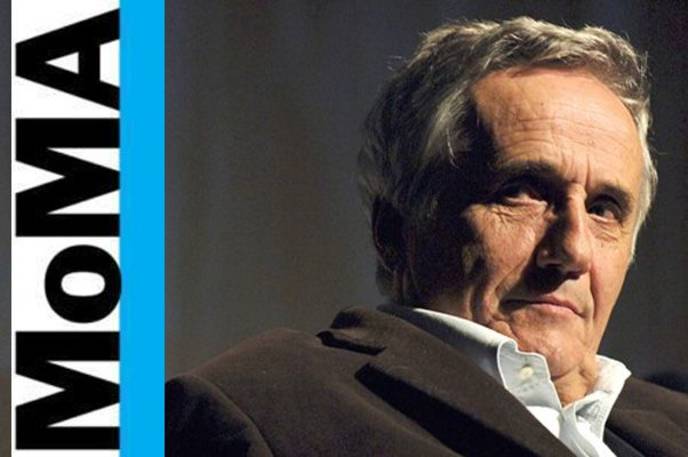


He was in town for two reasons: first a retrospective at Moma that celebrates 50 years of his career as a filmmaker (www.moma.org) and the presentation of the book about him titled Morality and Beauty edited by Sergio Toffetti. We're talking about Marco Bellocchio one of Italy's most celebrated film directors who, along with Bernardo Bertolucci and Pier Paolo Pasolini, has become a leading cultural figure for generations of Italians.
Born in Piacenza in 1939, Bellocchio first was interested in poetry, than he had a painting phase, tried to be an actor, applied to the film school Centro Sperimentale in Milan and became a director. He made his film debut in 1965 with Fists in the Pocket which immediately placed him at the forefront of international cinema. The film, a prophetic precursor to the student revolutions of the late 1960s, shocked Italian society and cinema and defined him a controversial director who consistently confronts the sociopolitical issues that define a particular moment. His films have addressed the anger and alienation that defined the generation of 1968 (Fists in the Pocket), religion seen through the eyes of an atheist whose mother is proposed for sainthood by the Vatican (My Monther's Smile), crucial historical moments, such as the kidnapping and execution of the Italian politician Aldo Moro (Good Morning, Night), and difficult issues, such as euthanasia (Dormant Beauty), inspired by current events.
The Moma retrospective features 18 of his films and runs through May 7th. “I think they selected most of my significant films,” Bellocchio told I-italy during a video interview (which will be aired soon!) “Of course they had to chose and some films were indeed excluded. I am surprised about the exclusion of Sorelle Mai, a 2010 film that is really personal.” Sorelle Mai is a nostalgic fantasy documentary that depicts in six episodes the Bellocchio's family story in Bobbio between 1999 and 2008.
And his family was in New York with him, his wife Francesca Calvelli, who works as an editor on his films, his son Pier Giorgio, who often acts for him, his daughter Elena and more... there was also actress Maya Sansa, who has starred in three of his films, and who, by now, is also part of the family. “Once you work with him,” Sansa told us, “a connection is established, a connection that remains unbroken, even after the shoot. It is very intense and there is a sort of telepathy. Marco says little, but if you are connected with him you know what he wants from you... and you become one.”
In the book Morality and Beauty Sansa is one of many who had something to say about the film director. “The book, which is bilingual, wants to tell how Bellocchio's cinema is made,” Sergio Toffetti said. It is divided into three parts: first there is a section called “The Filmmaking Machine,” which starts with a long interview with Bellocchio and then continues with a series of testimonies from people who have been on set with him. Among them, in addition to Sansa and his son Pier Giorgio, we find celebrated actor Sergio Castellitto, who has started in a couple of his films (My Mother's Smile and The Wedding Director) and Roberto Herlitzka, who played Aldo Moro in Good Morning, Night. The following section is called “Our Elder Brother,” and includes writing from a generation of Italian film directors who have come after Bellocchio and who have been inspired by his work. Among them we find Gianni Amelio and Marco Tullio Giordana. The third and last part includes essays, critiques and interpretations written by important film scholars, including Antonio Monda who addresses the issue of History and Revolution in Good Morning, Night. “I've not had the chance to read it all,” Bellocchio joked, “but I can say that Sergio has been successful in making me look good. It is incredibly helpful to know what people think of you and of your work. One of my greatest regrets is that I cannot find out directly form the audience what they get from watching my films. I would love to sit with them, and hear their response. It is incredibly helpful and fulfilling.”
Richard Peña, ex Director of Lincoln Center's Film Society and now Professor at Columbia University, wrote an introduction to the book, by the title Marco Bellocchio: Back in the USA, where he described the effects of Bellochio's cinema on American audiences. He wrote: “For American audiences, Marco Bellocchio has been something like a comet, a presence in the celestial cinematic heavens whose presence we've always known was out there but who would always draw close enough for us to actually see his work every ten or fifteen years. As a result, we've had to re-acquaint ourselves with him a few times, and yet although the style and some of the themes have changed, there's also a startling consistency to all he's done. Let's hope that, thanks to this current retrospective, now that we have him in our orbit we can now keep him close to us forever.”
We asked him if he feels like a comet, if he's planning to return in ten or fifteen years. Bellocchio smiled and reassured us that, although he is not planning to shoot anythingin the US, his cinema is here to stay.
Source URL: http://iitaly.org/magazine/events/reports/article/just-comet-marco-bellocchio-in-new-york
Links
[1] http://iitaly.org/files/momabellocchio1398230410jpg